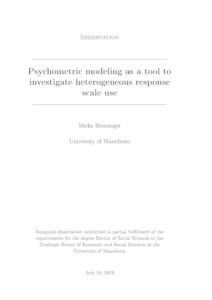|
Psychometric modeling as a tool to investigate heterogeneous response scale use
Henninger, Mirka
![[img]](https://madoc.bib.uni-mannheim.de/52490/1.hassmallThumbnailVersion/MHenninger_Dissertation_Drucklegung.pdf)  Vorschau |
|
PDF
MHenninger_Dissertation_Drucklegung.pdf
- Veröffentlichte Version
Download (11MB)
|
|
URL:
|
https://madoc.bib.uni-mannheim.de/52490
|
|
URN:
|
urn:nbn:de:bsz:180-madoc-524909
|
|
Dokumenttyp:
|
Dissertation
|
|
Erscheinungsjahr:
|
2019
|
|
Ort der Veröffentlichung:
|
Mannheim, Germany
|
|
Hochschule:
|
Universität Mannheim
|
|
Gutachter:
|
Gschwend, Thomas
|
|
Datum der mündl. Prüfung:
|
8 Oktober 2019
|
|
Sprache der Veröffentlichung:
|
Englisch
|
|
Einrichtung:
|
Außerfakultäre Einrichtungen > GESS - CDSS (SOWI)
Fakultät für Sozialwissenschaften > Politische Wissenschaft, Quantitative Sozialwissenschaftliche Methoden (Gschwend 2007-)
Fakultät für Sozialwissenschaften > Psychologische Methodenlehre u. Diagnostik (Meiser 2009-)
|
|
Fachgebiet:
|
150 Psychologie
300 Sozialwissenschaften, Soziologie, Anthropologie
|
|
Freie Schlagwörter (Englisch):
|
Item response theory , response styles , psychometric modeling , psychological measurement
|
|
Abstract:
|
Respondents use different ways to respond to rating scale items. Hence, item responses do not only capture the trait to be measured, but also the way respondents react to rating scales. So-called response styles have been incorporated in a variety of psychometric modeling approaches and investigated in applied fields. In my dissertation, I address psychometric and substantive research questions with regards to response styles in four research articles.
In the first article, we structure the variety of psychometric approaches accounting for response styles. We propose a superordinate, unifying framework for such models by introducing one common parameterization. This parameterization then guides our analysis of commonalities and differences, assumptions and identification constraints in the psychometric approaches (Henninger & Meiser, 2019a). We build on the proposed framework in our second article. Herein, we highlight application scenarios and demonstrate how assumptions on response styles can be tested through psychometric approaches. We furthermore develop two novel modeling extensions that lift constraints on model parameters or explain the influence of response styles on items through item attributes (Henninger & Meiser, 2019b).
In the third article (Henninger, 2019), I develop a psychometric modeling approach using a theoretically motivated restriction to achieve statistical identification. The model incorporates little a priori assumptions on response styles and retains the flexibility to account for various kinds of response tendencies in the data. Therefore, it is particularly useful in research environments where response styles differ between subgroups of respondents. The new model is tested in a simulation study and illustrated in a multi-country analysis using data measuring the Big Five personality factors.
The fourth article (Henninger & Plieninger, 2019) deals with processes underlying rating scale responses by examining response times. We find that extreme responding follows a different process than agree and mid responding, and that responses that are in line with the response style trait are given faster. Our analyses suggest that every respondent employs some type of response tendencies that facilitate certain category choices in terms of response speed.
In summary, I integrate existing and propose novel psychometric approaches for response style modeling, and provide new insights into the processes impacting rating scale responses. The two perspective on response styles are mutually reinforcing: psychometric models allow us to test assumptions on response styles. In turn, knowledge about the response process guides psychometricians in refining assumptions that are incorporated in modeling approaches.
|
 | Dieser Eintrag ist Teil der Universitätsbibliographie. |
 | Das Dokument wird vom Publikationsserver der Universitätsbibliothek Mannheim bereitgestellt. |
 Suche Autoren in Suche Autoren in
Sie haben einen Fehler gefunden? Teilen Sie uns Ihren Korrekturwunsch bitte hier mit: E-Mail
Actions (login required)
 |
Eintrag anzeigen |
|
|
 ORCID: 0000-0003-4676-2361
ORCID: 0000-0003-4676-2361



 Suche Autoren in
Suche Autoren in